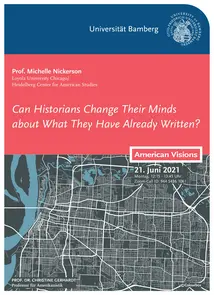Prof. Michelle Nickerson (Loyola University Chicago/Heidelberg Center for American Studies): "Can Historians Change Their Minds about What They Have Already Written?"
Monday, June 21, 2021, 12:15-01:45 p.m., online lecture
Zoom-Call ID: 944 5486 1061 (opens at 12 p.m. sharp)
The answer, according to Michelle Nickerson, is: yes, all the time. In 2013, she published a historical monograph called Mothers of Conservatism: Women and the Postwar Right about the role of Southern California women activists in their emerging conservative movement. This book was based on her Ph.D. dissertation in American Studies. The book, more so than the dissertation, probed the racial fears of the activists by documenting how concerns about school desegregation caused them to attack civil rights movement as dangerous communistic. In her presentation in Bamberg, she discussed the development in her analysis from dissertation to book and...thereafter. Her growing interest in urban U.S. history has, in her own words, honed her understanding of structural racism and the spatial dynamics of economic disparity. Housing covenants, red-lining, real estate agents, Home-Owners Association, and other forces all contributed to the maintenance of segregation and white privilege in the United States. In her talk, she spoke about how she would have changed her 2013 book if she could.
Michelle Nickerson is an associate professor of history at Loyola University, Chicago, where she teaches U.S. women's, gender, urban, and political history. She studies American conservatism, suburbanization, American Catholicism, the anti–Vietnam War movement, feminism, and the Cold War. Nickerson is the author of Mothers of Conservatism: Women and the Postwar Right (2012) and a coeditor of Sunbelt Rising: The Politics of Place, Space, and Region (2011). She is currently teaching at the Heidelberg Center for American Studies as a Fulbright scholar. Nickerson’s latest research on the Catholic antiwar movement of the Vietnam era will appear in the forthcoming book Spiritual Radicals: How the Camden 28 Put the Vietnam War on Trial, to be published by the University of Chicago Press.
